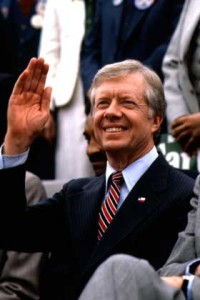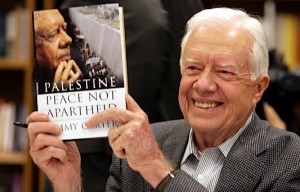To everything there is a season, and a time to every purpose under the heaven; a time to kill, and a time to heal; a time to break down, a time to build up… A time to love, and a time to hate; a time of war and a time of peace… [But above all else] a time to be born and a time to die.
(Ecclesiastes 3.1-6)
 Former U.S. President Jimmy Carter released the following statement about his cancer treatment yesterday:
Former U.S. President Jimmy Carter released the following statement about his cancer treatment yesterday:
Recent liver surgery revealed that I have cancer that now is in other parts of my body. I will be rearranging my schedule as necessary so I can undergo treatment by physicians at Emory Healthcare. A more complete public statement will be made when facts are known, possibly next week.
(The Carter Center)
This is clearly a very grave development. My thoughts and prayers are with him for a speedy recovery, which admittedly might be expecting too much of this 90-year-old do-gooder. Not to mention that it seems a miracle he’s still alive — given that his three younger siblings all died over twenty-five years ago of pancreatic cancer.
That said, his statement might seem rather frank and unsentimental. Except that Carter’s long public life has been punctuated by disarmingly frank and unsentimental observations. It is in this spirit that I offer the following.
According to inside-the-beltway gossip, every one of his successors has found Carter to be a meddlesome and self-righteous bore. This, of course, is at odds with his affable and genteel public persona. But, for what it’s worth, I know first hand that this gossip contains more than a kernel of truth.
 On the other hand, nobody could ever deny the exemplary work Carter has done since leaving office, which he himself describes as “waging peace, fighting disease, and building hope” all over the world. I am particularly fond of his volunteer work with Habitat for Humanity since 1984. Habitat is the “nonprofit ecumenical Christian ministry that builds homes with people in need regardless of race or religion.”
On the other hand, nobody could ever deny the exemplary work Carter has done since leaving office, which he himself describes as “waging peace, fighting disease, and building hope” all over the world. I am particularly fond of his volunteer work with Habitat for Humanity since 1984. Habitat is the “nonprofit ecumenical Christian ministry that builds homes with people in need regardless of race or religion.”
I will note, however, that he’s hardly deserving of all the praise he has received over the years for observing elections in places like DR Congo, Myanmar, South Sudan, and China. After all, it’s arguable that his election observers did no more to ensure free and fair elections in those countries than Christian missionaries have done to ensure good governance.
In fact, yet another “palace coup” is unfolding in Myanmar today, making a mockery of The Carter Center’s efforts to shepherd this country’s transition from military rule to democracy.
What’s more, even I have taken exception to some of his pontifical pronouncements. I had cause to do so just weeks ago when Carter cited foreboding developments in Russia, England, and China as evidence that Barack Obama’s success on the world stage has been “minimal.” After all, this is every bit as disingenuous (or resentful) as one of FDR’s predecessors citing foreboding developments in Germany, England, and the Soviet Union in 1940 as evidence that his success on the world stage had been minimal.
 But all criticisms of Carter in this regard pale in comparison with the commendation he deserves for calling a spade a spade where Israel’s oppression of the Palestinian people are concerned. He delineated and documented his concerns about the fatally flawed peace process to redress this oppression in his seminal book, Palestine: Peace Not Apartheid (November 2006).
But all criticisms of Carter in this regard pale in comparison with the commendation he deserves for calling a spade a spade where Israel’s oppression of the Palestinian people are concerned. He delineated and documented his concerns about the fatally flawed peace process to redress this oppression in his seminal book, Palestine: Peace Not Apartheid (November 2006).
Former U.S. president Jimmy Carter said in remarks broadcast Monday that Israeli policy in the West Bank represented instances of apartheid worse even that those that once held sway in South Africa…
‘The greatest commitment in my life has been trying to bring peace to Israel, Carter told the Atlanta Press Club last week.
‘Israel will never have peace until they agree to withdraw [from the Palestinian territories].’
(Haaretz, December 11, 2006)
Of course, the reason this criticism is so damning is that, on matters related to peace in the Middle East, Carter’s pronouncements are beyond reproach. This is so primarily because of the pivotal role he played in brokering peace between Egypt and Israel in 1979, which was a major factor in the Norwegian Nobel Committee awarding him the Nobel Peace Prize in 2002.
Get well, Jimmy.
Related commentaries:
Jimmy Carter…
A prayer for Ariel Sharon…